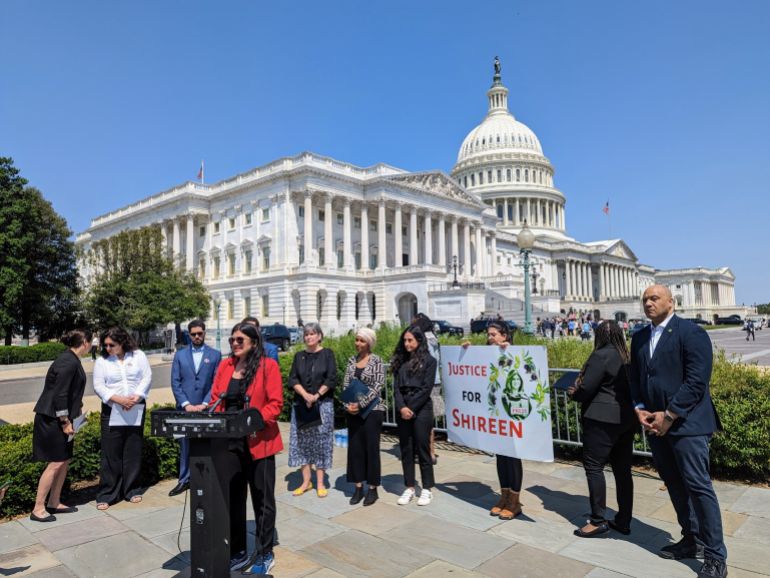A new documentary claiming to have uncovered the name of the Israeli soldier responsible for shooting Al Jazeera correspondent Shireen Abu Akleh has been released online.
Abu Akleh, a Palestinian American who had been with Al Jazeera since 1997, was killed while reporting from Jenin in the occupied West Bank in May 2022.
Shortly after her death, Israeli officials and media suggested she had been killed by Palestinian gunfire.
However, subsequent reports from human rights organisations and news agencies showed that the Palestinian fighters initially accused by Israel were some distance from Abu Akleh’s killing and, in September, Israel conceded there was a “high probability” its forces had “accidentally” killed the correspondent.
Contributors to the documentary, Who Killed Shireen? released on Thursday by Zeteo, suggested that Abu Akleh’s killing has helped further embolden a sense of impunity among Israeli soldiers, which has since contributed to the killing of more than 200 journalists by the Israeli military and settlers in the West Bank.
Here are four of the key takeaways from the investigation:
Biden administration knew that Israel was responsible for Abu Akleh’s killing
According to numerous testimonies featured in the film, officials within the Biden administration either knew or suspected that Abu Akleh had been shot by an Israeli soldier, but continued to support Israeli claims that she had been killed by Palestinians.
The filmmakers also claim that US officials had been informed by an unnamed Israeli general responsible for the West Bank within hours of Abu Akleh’s killing that one of his soldiers had likely shot her.
Despite this, US officials continued to support public Israeli accounts of Abu Akleh’s killing that attempted to shift the blame, and then, when Israel publicly admitted the likely culpability of one of its soldiers, that the killing was unintentional.
US officials did not publicly dispute that narrative, and instead said they were unable to determine if a crime had been committed without access to the shooter, which Israel refused to allow.
US refused to take the matter further
Speaking to reporter Dion Nissenbaum, one anonymous staffer within the former administration of President Joe Biden said that officials declined to press the Israeli administration on killing one of their citizens for fear of “anger]ing] the Israeli government”.
This is despite officials having concluded, the same source said, that Abu Akleh’s killing had been an intentional act.
Interviewed in the documentary, Eyal Hulata, who was Israel’s national security adviser at the time of the killing, defended Israel’s decision not to release the suspected soldier for questioning by the United States, saying that Israel had a “very good and trustworthy investigative mechanism”.
Asked if he could ever remember the subject of the US journalist’s murder arising in discussions between President Biden and Naftali Bennett, who was Israeli prime minister at the time, Hulala replies, “This wasn’t a topic between the prime minister and the president”.

Further requests from the Biden administration that Israel change the rules of engagement that some felt had led to Abu Akleh’s death met, according to one interviewee, “the brush off”.
The failure of the Biden administration to hold Israel to account or bring about a change to its rules of engagement after Abu Akleh’s murder has, US Senator Chris Van Hollen told filmmakers, contributed towards “the deaths of … other Americans and other civilians”.
The soldier blamed for killing Abu Akleh is now dead
The film reports that, according to soldiers active that day, Abu Akleh was killed by Alon Scagio, a sniper with the Israeli military’s elite “Duvdevan” unit.
Speaking of his response to having killed the journalist, despite her identity as a member of the press being clear, a friend of Scagio says he didn’t “remember anything special” about Abu Akleh’s killing, “so it wasn’t, like, an issue. He wasn’t happy, like, ‘ Hey, I killed a journalist, ‘ of course, but he wasn’t … eating himself from the inside”.
Investigations by the filmmakers show Scagio was moved out of the Duvdevan to a commander position in a different unit, distancing him from any investigation, as a result, the filmmakers guess, of having killed Abu Akleh.
Scagio was later killed in June 2024 by a roadside bomb in Jenin, the same West Bank city in which he is accused of killing Abu Akleh.
As a result of the fallout from Abu Akleh’s killing, Scagio’s friend claims the Duvdevan unit took to using her image for target practice.
US government support for Israel is unwavering
The killing of Abu Akleh came during what at the time was considered an intense phase of Israeli raids on the occupied West Bank. She was one of at least 145 Palestinians killed during the raids in 2022.
But since then, Israel has only ramped up its violence in both the West Bank and Gaza.
Israel has killed more than 52, 000 Palestinians since it launched its war on Gaza in October 2023, decimating the territory and refusing the entry of food since March, starving the local population.
And in the West Bank, Israel has increased the severity of its attacks, using heavy weaponry and air strikes, and forcing Palestinians out of their homes. More than 900 Palestinians have been killed there.

Despite that, the US – both under former President Joe Biden and current President Donald Trump – has maintained its support of Israel, even as much of the rest of the world has criticised its actions.
At the United Nations, the US regularly votes alongside Israel, while the majority of member states seek to use the international body to pressure Israel to stop. And the US has threatened the International Criminal Court for seeking to arrest Israeli Prime Minister Benjamin Netanyahu for committing war crimes.
Source: Aljazeera

Leave a Reply